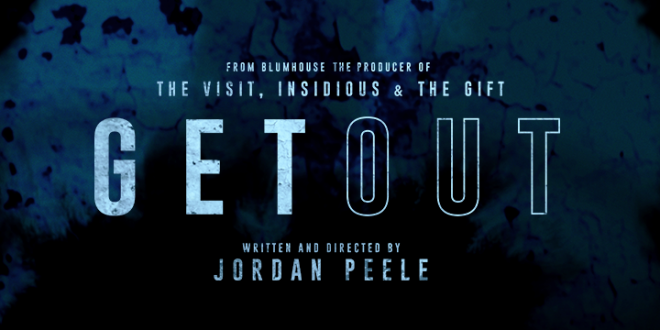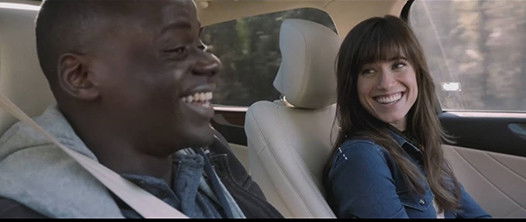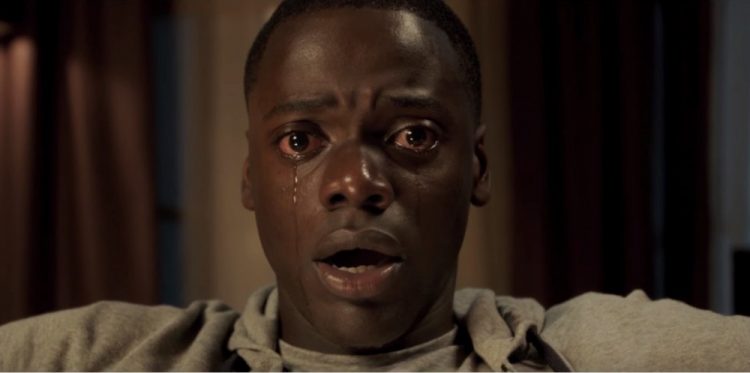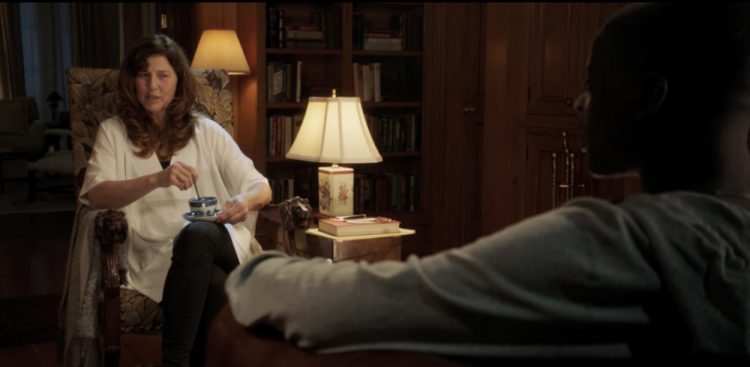As a horror junkie, I am going to tell you that without a doubt you need to see this movie. You need to have seen it yesterday. This is the kind of movie I would not mind paying to see three or four times and then buying on DVD. I want to find Jordan Peele and just hand him my wallet. This is the kind of horror production I want more of, need more of. Get Out is sure to be a modern classic, and hopefully required viewing in film classes across the world.
This review is going to contain spoilers, so if you haven’t seen the film yet, I highly recommend turning away and getting your butt to a theater to see it.
The movie follows Chris, a young Black Brooklynite who is an up-and-coming photographer with a white girlfriend. He goes with her to her family’s home in the affluent suburbs. However, what starts off as normal micro-aggressions and awkwardness gives way to a more sinister and terrifying plot. The movie leads us to believe that they mean to brainwash Chris into being a slave, but in reality they want to place the mind of a white person, have them subjugate the original consciousness and force them to watch as someone else lives out their lives.
This whole movie is about the consumption of “Blackness” — Black culture, Black art, and even the Black bodies. It’s no secret that white culture has been heavily influenced by, if not outright stolen, aspects of Black culture to use for themselves. However, the movie pushes that metaphor by trapping, kidnapping, and violating Black bodies by putting white brains inside. The worst part is that the consciousness of the victims doesn’t disappear, but rather they have to perpetually watch their lives being lived out in ways they did not choose. Every sympathetic white person in the film who treats Chris with dignity or respect turns out just to be using him, humoring him only insofar as they can get what they want out of him. The most obvious is when Chris is talking to the blind art dealer before their operation — at first he comes off kind but after Chris makes the connection about what will occur, the art dealer cuts off the conversation, not allowing Chris to express any fear, sadness, or anger — hell, he doesn’t even get to ask any questions. This movie isn’t making a statement about the gentrification of Blackness, as some thought, but how insidious white culture is in its continuous attempts to re-dominate Black people.
What this movie excels at is building an atmosphere of tension and unease. It begins just with people seemingly stumbling around the weird racial politics in the United States. The way Rose’s dad talks about deer at the beginning is reminiscent of how people talk about minorities, the party guests inspecting Chris in weird and uncomfortable ways, the weird bringing up of how Rose’s grandfather lost to Jesse Owens in 1936. However, slowly things seem to come apart as we see the silent bidding on Chris, and we realize that something is indeed very, very wrong. It also helps that the hypnosis section is so terrifying, what with slipping into a dark pit and sinking through the floor into yourself and your nightmares.
Here’s how you know this is a great movie: at the end, when the police car comes up on Chris strangling a dying Rose is revealed to be Rod in a TSA car, not only was the sigh of relief audible but people started clapping. Peele is masterful at building the tension and then releasing it in such a way that doesn’t detract from the drama and anxiety.
Peele’s writing and direction is impeccable. The fact that this is his very first film is almost mind-blowing, and especially since it’s not a comedy like his other work. Every visual is masterfully set up, most notably so when Chris has been taken into the basement, with all the retro furniture and deer head that would look more at home in a Wes Anderson film. In fact you see a lot of director’s influence here: some Julie Taymor in the Sunken Place, lots of Quentin Tarantino in the finale, even some Lars von Trier with the weird deer scene in the forest. None of it feel derivative or like someone’s else movie and that’s the real magic. Whatever his next film is, I hope he makes more movies soon — we need new and interesting voices in the cinema.
In terms of the acting, I have to give props to Allison Williams for playing the ultimate bait and switch of being “woke” and then being the worst of the family in the end so perfectly — it is truly eerie. Daniel Kaluuya’s Chris is a great blend of afraid and trying to play it cool, though when he finally makes his escape, that façade comes crashing down as he fights for his freedom. Bradley Whitford and Catherine Keener are terrifying as Rose’s parents, easy-going and light-hearted, and yet, ready to pounce. The power of the performances is what sells the atmosphere as realistic up until it all come apart, and even though horror movies don’t get award nominations, these actors deserve some recognition.
If I had one compliant, it is only a minor one. The brother, played by Caleb Landry Jones, seems kind of a throw away character who only seemed to be there to represent the hyper-aggressive white alpha bro and then just be another person to fight in the finale. I just didn’t think he was that important or interesting but he’s so minor that it makes no difference.
I cannot stop gushing about this movie. It is that perfect. It masterfully blends reality and horror, making a political statement in a way that it is immediately approachable and understandable. It finally presents a horror story that blends history, modern politics, and satire from a Black perspective. Go see it if you haven’t, and even if you have, go see it again.
Get Out is a marvel of modern cinema and deserves to be treated as such. A horror movie so powerful, it has successfully blended real-life anxieties about being Black with a premise that is both futuristic and yet oddly reminiscent of the past. As far as directorial debuts go, Jordan Peele’s rivals the best of the best, and I hope this helps him green light any and all of the projects he wants.





